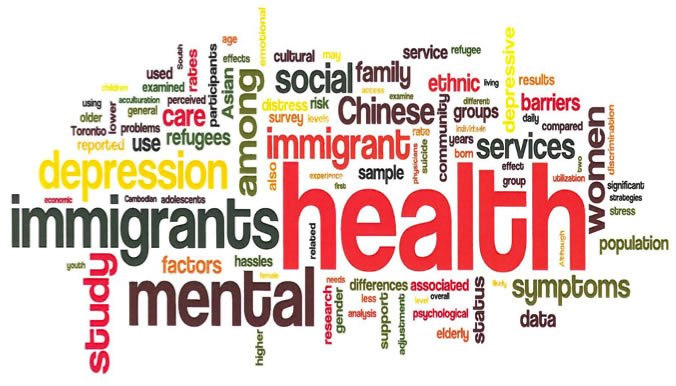By: Raissa Amany, Executive Coordinator
Known as the cultural melting pot, Canada is home to many different ethnicities and backgrounds amongst its population. With its diverse population, Canada comprises 21% of the immigrant population - one of the highest ratios for industrialized Western countries (Pison, 2019). Given the increase of diverse populations in the next decade or so, it is a more significant reason for mental health services and clinicians to be adopting a culturally competent care model.
What does culturally competent care mean? And how does that apply to mental health services? Let’s break it down!
The term cultural competence in healthcare is defined “as a set of strategies used by those in helping professions to manage the effects of increased diversity on the health and mental health systems.” (Sundar et al., 2012). However, it is specifically more about the “delivery of services that are responsive to the cultural concerns of racial and ethnic minority groups, including their language, histories, traditions, beliefs and values” (Whaley & Longoria, 2008).
As such, this means providing individualized quality care to patients who come with a wide range of views, attitudes, values, and behaviours. This can be in forms such as their languages, histories, traditions, and more. From a clinician’s perspective, being culturally competent can include applying open-mindedness, self-awareness, and integration/application of cultural knowledge (Sundar et al., 2012; Tulane University School of Public Health and Tropical Medicine, 2021).
There are four key areas of cultural competence outlined by Sundar et al. (2012):
Emotional component: focusing on the individual’s perception of difference along with the associated feelings. This component is important as it gets clinicians to become aware of their own feelings and reactions to individuals based on different ethnoracial and cultural characteristics, whilst promoting a sensitive and respectful practice of cultural diversity (Eunyoung, 2004).
Knowledge Component: focusing on understanding that there are unique differences in world views of people who are ethnically, culturally, and racially different than us - which requires self-awareness to understand how our own beliefs, values, and attitudes shape and affect the way we perceive and interact with others (Bhui & Warfa, 2007; Yan & Wong, 2005).
Skills Component: Focusing on constructing tools that can be utilized to provide effective services to people across different backgrounds, such as assessments, interventions, communications, etc. (Sue, 2001a, 2000b).
Behavioural Component: Focusing on developing appropriate interventions based on an understanding of the emotional, knowledge, and skills factors (Allen, 2007). This usually happens in the final stage of achieving cultural competence.
Providing culturally competent care not only makes mental health services accessible but also benefits everyone. Not only does it reduce the risk of misdiagnosis, but culturally competent care improves compliance and safety with therapy, along with reducing healthcare disparities. However, cultural competence also requires cultural humility as practitioners and systems must recognize the limits to people's understanding of others along with the unconscious bias we might have towards other cultures other than our own. Thus, cultural humility often includes periodic elements of self-reflection of one’s understanding of other cultures along with their implicit biases that may cloud their perception of other cultures (Sundar et al., 2012; Tulane University School of Public Health and Tropical Medicine, 2021).
There is also a need of using a culturally competent model that requires mental health systems to personalize mental health care approaches according to a person’s background (Sundar et al., 2012; Tulane University School of Public Health and Tropical Medicine, 2021). Understanding the intersectionality of culture along with social aspects such as health, economy, status, and more - it is important to note that there are social determinants of health that play a large role in mental health care outcomes.
As such, we can expect mental health systems and institutions to start adopting culturally competent care - whether it be through:
Specific models of care or interventions
Organizational values
Governance
Planning and monitoring/evaluation
Communication
Staff development
Organizational infrastructure
Services and interventions
This can be modelled in many different ways such as ethnic matching of patients and providers, “developing culturally adapted interventions”, or “offer patients interventions drawn from their own cultural traditions.” - The options are endless to truly cater to the population we are serving (Kirmayer, 2012).
It is critical for all providers and mental health systems to adopt a culturally competent lens as not providing individualized culturally competent care might lead to further harm to the individual and cause further trauma. I would encourage everyone to take a self-reflection on when we perceive and interact with others, and how our own social constructs play a role in how we see things through our own lens.
If you are looking for more information to read more about cultural competence and to delve further into cultural humility and cultural safety (which I did not have a chance to get into!), here is a good resource: https://kidsnewtocanada.ca/culture/tools.
Raissa Amany is an Undergraduate Honours Health Sciences Student at the University of Ottawa specializing in Population and Public Health. She is passionate about the intersectionality of public health - specifically within the realms of health equity and child and youth health.

